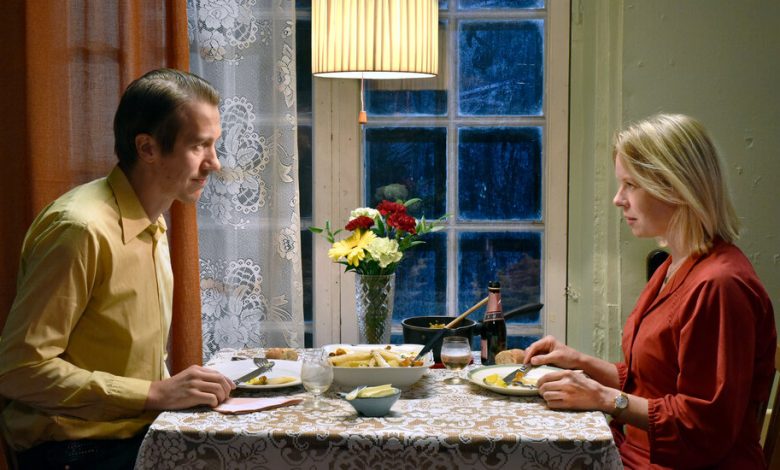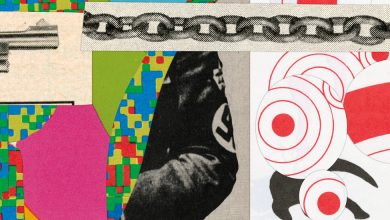‘Fallen Leaves’ Review: Love (and Laughs) Among the Ruins

Modestly scaled and tonally perfect, “Fallen Leaves” opens in a fluorescent hell-on-earth and ends with a vision of something like paradise. In between, there are lonely nights, fleeting joys, ordinary degradations, laborious work, karaoke reveries, many cigarettes and more drinks. A lot of the drinks are downed hurriedly and often furtively by a man, while elsewhere a woman listens to sad songs. Outwardly, these two are leading lives of quiet desperation, though because this is an Aki Kaurismaki movie, their despair comes with great comic timing.
A Finnish writer-director best known on the international festival circuit (“Fallen Leaves” won a major award at the 2023 Cannes), Kaurismaki makes movies — precise, austere, plaintive — that resist compartmentalization. Since the early 1980s, he has honed his minimalist visual style and quietly ironic sensibility in more than 20 narrative features that tend to be classed as comedy dramas, tragicomedies or some other hyphenated admixture; the movies are sometimes described as bittersweet, though, for me, their long aftertaste tends to be more sweet than bitter. Yet even these descriptors are too confining.
Set in contemporary Helsinki, “Fallen Leaves” opens on the woman who listens to sad songs; it’s a habit that suggests she’s a familiar genre type — she isn’t. A supermarket worker of indistinct age and few smiles, Ansa (Alma Poysti) is impassively restocking some shelves when you first see her. It’s a vivid tableau of everyday banality complete with listless customers, unflattering lighting and the rhythms of alienated labor. And then there is the petty humiliation embodied by the uniformed market guard hawkishly watching Ansa, as if she is a prisoner who, at any second, is about to make a break from it.
That’s pretty much what happens when a supermarket manager later fires Ansa for taking some expired food. (She also gives food away.) Kaurismaki doesn’t furiously underscore the cruelty of the manager’s decision; the violence of Ansa’s termination — and that of the pitiless world the manager serves — is as self-evident as the horror in each news report from Ukraine that she regularly listens to. Instead, with a few restrained words and the pacific countenance of a typical Kaurismaki character, Ansa keeps her composure and her eyes on the manager, turning her inexpressiveness into a form of dignified resistance. She makes her break.
Shortly thereafter — the movie is only 81 minutes, so things happen quickly here — Ansa meets the drinking man, Holappa (Jussi Vatanen), at a bar. As their friends flirt, amusingly advancing and retreating, Ansa and Holappa trade fugitive looks, their gazes ricocheting around the room. They don’t speak that night, but when they run into each other later, Holappa invites Ansa to the movies. They see Jim Jarmusch’s zombie splatter-fest “The Dead Don’t Die,” watching it without smiles. (Jarmusch and Kaurismaki, twinned virtuosos of deadpan comedy with aesthetic affinities, are friends.) Afterward, Ansa and Holappa agree to meet again, but when he loses her number, each risks losing a chance at happiness.
“Fallen Leaves” is consistently funny, but its laughs arrive without fanfare. They slide in calmly, at times obliquely in eccentric details, offbeat juxtapositions, taciturn exchanges, long pauses and amiably barbed insults. When Holappa’s friend Huotari (Janne Hyytiainen) puts some moves on Ansa’s friend Liisa (Nuppu Koivu), she says his voice is “well-preserved for such an elderly man.” (He doesn’t give up.) There’s humor in the image of Holappa, who sleeps in a work dorm, sitting on his simple bed next to a Tom Jones poster, but also pathos; there’s also a glimpse of his possible future when “Mambo Italiano” plays in a bar filled with other men, who, with their faraway looks and sagging faces, seem alone even when together.
For a stretch of time, Ansa and Holappa go their separate ways, joined only by the supple editing, some visual similarities and the hyperbolically, at times comically, miserabilist songs that bridge scenes and — like the splashes of color and the numerous film posters scattered throughout the movie — express emotions that the characters don’t or can’t. Their striking reserve, both physically and verbally, can sometimes make them seem defeated, wrung out or just stunned by life. It is very relatable. It is also critical to Kaurismaki’s technique, because by withholding emotion onscreen, he isn’t telling you how to feel but instead giving you space to discover and perhaps fall for these characters on your own.
The separation of lovers is also a classic convention in romantic fiction, one that turns longing and foreplay into narrative and sometimes suspense. (Will they, or won’t they?) There’s not much doubt that Ansa and Holappa will again find each other in “Fallen Leaves” (though your heart may skip a beat when they stand in front of a poster for the crushing 1945 romance “Brief Encounter”). There’s pleasure in how Kaurismaki keeps Ansa and Holappa apart and how he teases out their story to quietly build emotional tension. There’s even greater, more lasting pleasure in how — despite the precarity and violence of this world, which can isolate people from one another and their own selves — he tenderly coaxes them together.
Fallen Leaves
Not rated. In Finnish and Arabic, with subtitles. Running time: 1 hour 21 minutes. In theaters.




